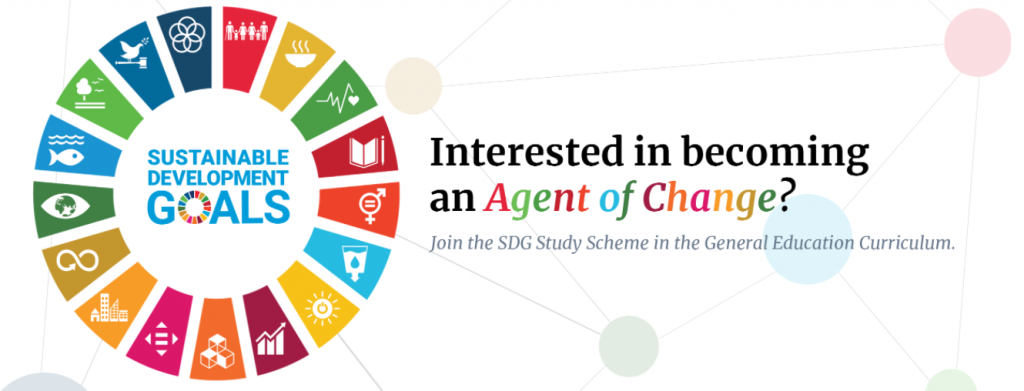Esta web utiliza cookies para que podamos ofrecerte la mejor experiencia de usuario posible. La información de las cookies se almacena en tu navegador y realiza funciones tales como reconocerte cuando vuelves a nuestra web o ayudar a nuestro equipo a comprender qué secciones de la web encuentras más interesantes y útiles.
SDG Study Scheme in the General Education Curriculum: Engagement with SDGs to Cultivate Global Citizens
Description
Institution
Office of University General Education, The Chinese University of Hong Kong

Organizations/areas of the university involved
Office of University General Education, The Chinese University of Hong Kong
Country
Hong Kong SAR, The People's Republic of China
Using the 17 SDGs as a framework, the SDG Study Scheme in the General Education curriculum aims at helping students develop the necessary knowledge and skills to contribute to solving complex global challenges.
As one of Hong Kong’s leading universities, The Chinese University of Hong Kong (CUHK) has local, national and global responsibilities. We are committed to translating our social responsibilities into action, by empowering and transcending our core functions – teaching, research and engagement —To tackle various pressing social issues and sustainability challenges.
To better prepare students for the challenges of tomorrow, the Office of University General Education (OUGE), CUHK launched an optional SDG Study Scheme in the 2020–21 academic year.
Students are encouraged to take ownership of their learning and adopt SDGs as a unifying theme to extend their learning from knowledge-based courses to experiential and service learning.
The Study Scheme has three components, combining knowledge-based learning with experiential and service learning. Under the Study Scheme, students have to fulfill ALL of the following requirements:
- A short online course “How to achieve the SDGs” by the SDG Academy, which provides an overview of the SDGs and their significance;
- Three knowledge-based General Education courses (“SDG-GE”); and
- One social-engagement course (“SDG-SE”), or engagement in at least 80 hours of co-curricular voluntary activity (“SDG-VA”).
Students are awarded an SDG Explorer certificate if they fulfill all of the stipulated requirements of the Study Scheme. Those who perform well in the scheme and have outstanding performance in SDG-SE or SDG-VA are named SDG Achievers.
Results and impact measured or expected
There are currently 35 SDG-GE courses offered by nine different departments or units, and more than 1,000 students enrolled in the 29 courses offered in Term 1 and Term 2 in the 2020–21 academic year. Overall, students are satisfied with both the course (average score: 5.25 on a 6-point scale) and the teachers’ performance (average score: 5.52).
The second round of calls was issued in November 2020, followed by another stakeholder-engagement workshop. A total of 38 teachers and administrative staff from 22 different departments or units attended the workshop. The Study Scheme will offer more courses in the coming academic year.
To engage campus members and the general public on issues related to SDGs, an online talk series “SDG Forum” was launched in June 2020. About 700 people attended the five sessions in the series. The average overall satisfaction rating among the participants was 4.2 (on a 5-point scale).
Connection with the SDG framework
The SDG Study Scheme employs transformative learning approaches including interdisciplinary, action-based learning and multi-actor involvement.
Apart from the interdisciplinary nature of the SDG-GE courses, the social engagement component of the Study Scheme encourages students to integrate their academic learning with service learning and / or voluntary activities relevant to at least one SDG, and to apply and connect prior knowledge with the observations in the field to plan and take action. The aim is to engage different stakeholders and make a difference in the local, regional or global community to promote the quality of life and / or the environment.
Barriers and follow up
The progress of Experiential Learning (e.g. field trips, practicum, service learning, etc.) has been gravely interrupted due to COVID-19.
With the launch of the SDG Study Scheme, we have established an SDGs-related Experiential Learning Activity Fund (the Activity Fund) for teachers to organize experiential learning activities. Upon receiving the fund and learning that traditional field trips to nature reserves and outbound exchanges are not possible at the moment, teachers have come up with innovative ideas for turning challenges into opportunities. Teachers have organized virtual fieldtrips for the students and students’ feedback are largely positive.
All the multimedia production created as an alternative solution this year could serve as useful resources for the upcoming cohorts when discussing similar topics, especially when face-to-face activities are allowed again in the future.
Transferability of the initiative
In the longrun, if the reception of the SDG Study Scheme by students and teaching staff is largely positive, the University’s Major Programs may consider integrating SDGs in their courses. The significance of extending the SDG-related courses to Major Programs is that both specialized knowledge and inter-disciplinary understanding are essential for addressing the many global challenges. Integration of GE with Major Programs to pursue SDGs will help students gain a more holistic view of global problems, and better prepare them to be responsible global citizens.
Besides, there are three learnings from implementing this initiative for sharing with SDSN members:
- Faculty buy-in is essential and faculty engagement should go first.
- Encouraging students to take ownership of their learning and to serve are the keys to cultivating global citizens.
- Building collaborative partnerships with other departments and units is important for further development of Education for SDGs in the University.
Education 4 SDG funciona gracias a WordPress


